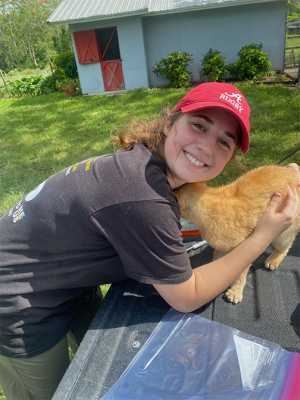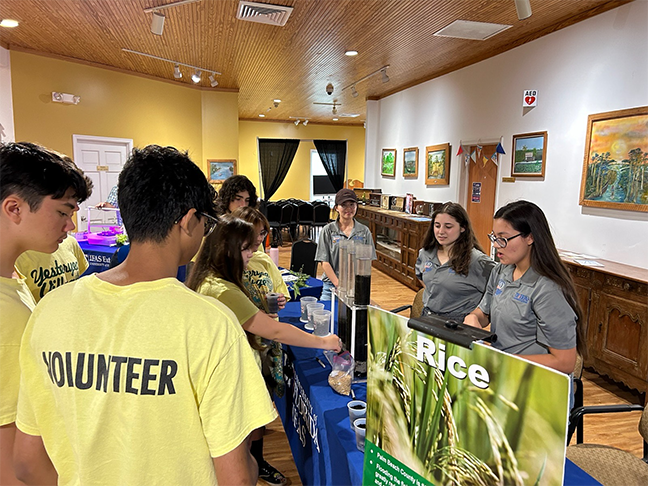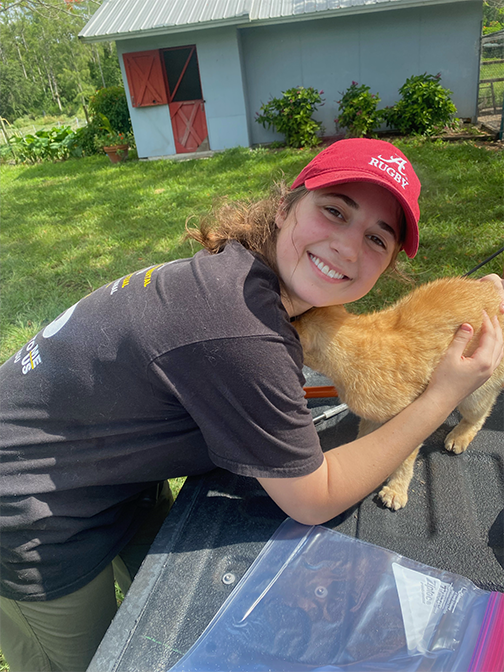By Kistler Hunt
Honors College junior Brenna Dold spent this past summer participating in a National Science Foundation Research Experiences for Undergraduates (REU) program through the Science and Technology for Phosphorus Sustainability (STEPS) Center. Dold is majoring in cellular and molecular biology, with a minor in nutrition and foods. For this REU, Dold worked at the University of Florida’s Triple-Bottom Line site with Dr. Jango Bhadha, assistant professor in the Department of Soil, Water, and Ecosystem Sciences and Theme 2—Human Scale principal investigator.
Dold spent nine weeks fully funded at the Everglades Research and Education Center in Belle Glade, Florida. She additionally spent a week in Raleigh, North Carolina, at North Carolina State University — which is where the STEPS Center is based — to meet with the other REU recipients. The STEPS Center, as Dold describes, “is a convergence research center composed of diverse scientists whose purpose is to address challenges related to phosphorus sustainability by integrating disciplinary contributions across the sciences. Their vision is to facilitate a 25% reduction in human dependence on mined phosphates and a 25% reduction in losses of point and non-point sources of phosphorus to soils and water within 25 years.”
Dold worked alongside Gisella Magana, another undergraduate student on the REU program. They worked under Dr. Bhadha and his Ph.D. students investigating the effects of pre-flooding rice fields on their phosphorus uptake. This involved working in flooding rice paddies and collecting soil samples. Dold also worked in the lab analyzing soil samples she took in the field using a variety of analytical techniques. Dold states that she enjoyed, “being able to gain so much experience from people so willing to help you succeed…It truly was an amazing experience being able to learn so many valuable techniques.”
Dold was initially inspired to apply for the REU by her sophomore year Honors seminar, HON 2515: Research to Action Multidisciplinary Problems (RAMP): Wicked Phosphorus (this year called Wicked Environmental Problems), which she took in the Fall 2022 semester with five different faculty across various disciplines: Dr. Anne Fanatico, professor in the Department of Sustainable Development; Dr. Mike Hambourger, associate professor in the Department of Chemistry and Fermentation Sciences; Dr. Jay Rickabaugh, assistant professor of public administration in the Department of Government and Justice Studies; Dr. Bob Swarthout, associate professor in the Departments of Chemistry and Fermentation Sciences and Geological and Environmental Sciences; Dr. Shea Tuberty, professor in the Department of Biology. The course offers a unique approach to phosphorus sustainability where students learn from faculty and guest lecturers and conduct a collaborative research project that investigates problems related to phosphorus under the guidance of a faculty advisor.
About the HON seminar, Dr. Rickabaugh remarked, “The RAMP class is unique from other seminars in the Honors College because we focus explicitly on transdisciplinary education (sometimes also called convergence learning)…My research investigates how different government agencies (agriculture, environmental quality, etc.) promote or inhibit more sustainable use of phosphorus, but I need my other colleagues' expertise in soil microbes and chemistry, surface water quality measurement, and other knowledge to know the magnitude of the impact of those government interventions…The ability to bring together varied and interdependent expertise is necessary to solve many of today's more complex problems (food insecurity, opioid addiction, other environmental challenges).”
Dold stated that she initially enrolled in the course because she was interested in research. In the seminar, Dold worked alongside three other Honors College students to use colorimetric detection to measure phosphorus in wastewater systems from the Boone wastewater treatment plant. They were guided by Dr. Hambourger. Dold explains that the RAMP course helped her in the work she would do in the REU. Additionally, she stated, “forming relationships with high-level professors” helped prepare her for interactions she would have with those involved in the REU.
Dr. Rickabaugh further explained, “Students who participate in RAMP will have some kind of hands-on research project and an opportunity to think about how different academic fields view their research differently. That research might be collecting surface water or soil samples for lab analysis, analyzing government records or other information, or hands-on work in a garden or on a farm. We also spend time discussing how our different disciplines understand the world and how those views intersect. For example, social scientists often do not have a lab where they can control external factors and isolate the variable of interest the way a chemist can. That means some lab sciences may understand a relationship between variables clearly and precisely in isolation, but hit complications when it gets evaluated in the natural world. Social scientists rarely get the benefit of isolation from a lab, but may more clearly understand the interdependencies of the variables in the social world as it exists.”
After Dold completed the HON seminar, she received an email announcement about the REU program from a staff member in the Research Institute for Environment, Energy, and Economics, who oversees the RAMP course, encouraging students to apply. Dold filled out the application, which included a personal statement, an essay, and a couple of questions about her background. In the application, Dold was asked to select three faculty that she would like to work with if selected. After being selected for the program, Dold learned that she was selected to work with Dr. Jango Bhadha, her first choice.
Photo features Dold (second from right) at an outreach event as a part of her REU. Photo submitted.
When describing what her REU means for her future goals, Dold remarked, “If I decide to do research in the future, this will absolutely help me succeed. I can use the skills and connections I gained...” She added that the experience “taught me to be diverse in my thinking.” Dold is currently in the beginning stages of developing her prospectus and committee for her Honors College thesis research.
Top photo features Brenna Dold. Photo submitted.


